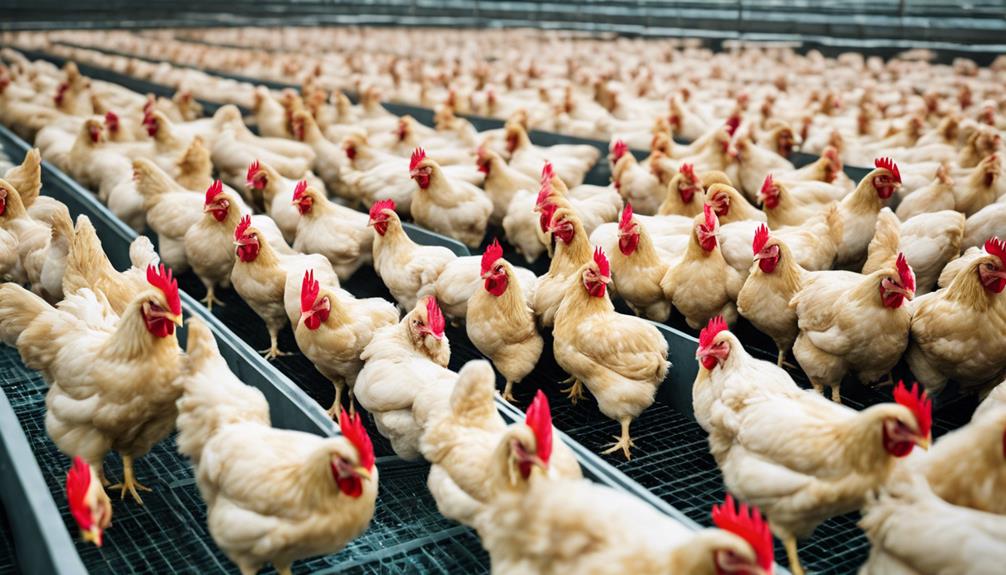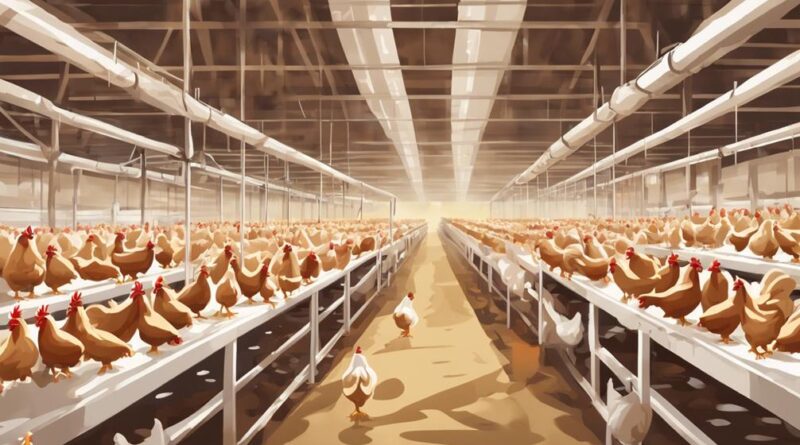Why Is Vaccination Vital in Chicken Farming?"
Vaccination in chicken farming is essential for maintaining flock health, preventing disease outbreaks, and optimizing productivity. It helps in controlling common poultry diseases, reducing mortality rates, and improving overall bird welfare. By following a comprehensive vaccination program and adhering to biosecurity measures, you can safeguard your chickens from potential illnesses and ensure a healthy environment. Additionally, vaccination promotes economic benefits by preventing production losses, reducing antibiotic use, and meeting market demands for safe poultry products. Embracing vaccination practices is crucial for the long-term sustainability and success of your chicken farming operation. Achieve optimal health and productivity for your flock through proper vaccination protocols.
Importance of Chicken Vaccination
Understanding the significance of vaccinating chickens is crucial for maintaining a healthy and productive poultry farm. By implementing a robust vaccination program, you can prevent mortality and significantly increase productivity in your chicken farming operation. Vaccines play a pivotal role in safeguarding your flock against a myriad of diseases that can cause devastating losses if left unchecked.
When it comes to preventing mortality, vaccines are your frontline defense. Diseases such as Newcastle disease, infectious bronchitis, and Marek's disease can wreak havoc on an unvaccinated flock, leading to widespread illness and death. By vaccinating your chickens against these and other common poultry diseases, you can effectively shield them from potential outbreaks, keeping mortality rates low and ensuring the overall health of your birds.
In addition to preventing mortality, vaccination also plays a crucial role in boosting productivity on your farm. Healthy chickens are more likely to thrive, grow efficiently, and lay eggs consistently. By protecting your flock from infectious diseases through vaccination, you can create an optimal environment for your chickens to flourish, ultimately leading to higher yields and increased profitability for your poultry farm.
Preventing Disease Outbreaks
To effectively safeguard your poultry flock and maintain a disease-free environment, implementing a comprehensive vaccination strategy is imperative. Disease prevention in chicken farming is a critical aspect that requires careful planning and strict adherence to biosecurity measures. By proactively vaccinating your chickens against common diseases such as Newcastle disease, infectious bronchitis, and Marek's disease, you can significantly reduce the risk of disease outbreaks on your farm.
In addition to vaccination, biosecurity measures play a crucial role in preventing disease spread among your flock. Biosecurity involves practices that minimize the introduction and spread of pathogens. This includes controlling access to your farm, proper sanitation procedures, and monitoring the health of incoming poultry. By implementing strict biosecurity protocols, you can create a protective barrier against diseases that could devastate your poultry operation.
Regularly monitoring the health of your chickens is essential for early detection of any signs of illness. Quick identification and isolation of sick birds can prevent the spread of diseases within the flock. Additionally, maintaining a clean and hygienic environment, proper ventilation, and providing adequate nutrition will contribute to the overall health and immunity of your chickens.
Boosting Immunity in Flocks
Boosting the immunity of your poultry flock is essential for maintaining optimal health and productivity. Improving the immunity of your chickens can significantly enhance their disease resistance and overall well-being, ultimately leading to improved productivity in your farm. There are several key strategies you can implement to boost the immunity of your flock.
Firstly, ensuring your chickens have a balanced diet rich in essential nutrients is crucial for supporting their immune system. Make sure they've access to high-quality feed that contains vitamins, minerals, and proteins necessary for a strong immune response. Additionally, providing clean drinking water at all times is essential for overall health and immunity.
Secondly, maintaining proper hygiene in the coop is vital for preventing disease outbreaks and boosting immunity. Regularly clean and disinfect the living areas of your chickens to reduce the risk of infections. Proper ventilation and adequate space are also important factors that can contribute to a healthy environment for your flock.
Lastly, consider implementing a vaccination program tailored to the specific needs of your poultry. Vaccines can provide an additional layer of protection against common diseases, further enhancing the immunity of your flock.
Ensuring Healthy Chickens
Maintaining optimal health and productivity in your poultry flock requires a proactive approach to ensuring the well-being of your chickens. Disease control is a critical aspect of keeping your chickens healthy. Implementing biosecurity measures is essential to prevent the introduction and spread of diseases within your flock. Biosecurity measures include controlling access to your farm, proper sanitation practices, and monitoring the health of your chickens regularly.
To effectively control diseases in your flock, it's crucial to vaccinate your chickens against common pathogens. Vaccines help prime the immune system to recognize and fight off specific diseases, reducing the likelihood of infections spreading among your chickens. However, vaccination alone isn't sufficient. You must also maintain a clean environment, practice good hygiene, and monitor for any signs of illness.
Regularly inspecting your chickens for any symptoms of disease is vital for early detection and prompt treatment. Isolating any sick chickens can help prevent the spread of illnesses to the rest of the flock. Additionally, providing your chickens with a balanced diet, access to clean water, and adequate living space contributes to their overall health and well-being.
Economic Benefits of Vaccination
Implementing a strategic vaccination program in your chicken farming operation can lead to significant cost savings and improved profitability. By vaccinating your chickens against common diseases, you can reduce the risk of illness spreading through your flock, ultimately lowering the need for expensive treatments and the associated labor costs. Vaccination helps in preventing production losses due to diseases, ensuring that your chickens are healthy and productive.
Moreover, investing in vaccination can enhance the quality of your poultry products, meeting market demand for safe and healthy food. Consumers are increasingly conscious of the origin and quality of the food they consume, with many preferring products from animals raised without the use of antibiotics. Vaccinating your chickens allows you to reduce antibiotic usage, which not only aligns with consumer preferences but also helps in avoiding the costs associated with antibiotic treatments.
Reducing Antibiotic Use
To decrease reliance on antibiotics in chicken farming, prudent vaccination strategies are essential for disease prevention and flock health maintenance. Reducing antibiotic use in poultry is crucial for several reasons. Overuse of antibiotics can lead to the development of antibiotic-resistant strains of bacteria, making it more challenging to treat infections in both chickens and humans. By implementing effective vaccination protocols, you can significantly reduce the need for antibiotics, thus minimizing the risk of resistance development.
Vaccines work by stimulating the chicken's immune system to produce a protective response against specific pathogens, preventing infections and reducing the overall disease burden in the flock. This proactive approach not only improves the health and welfare of the chickens but also helps in maintaining a sustainable and efficient farming operation. Moreover, vaccines are specifically designed to target prevalent diseases in poultry, providing targeted protection without the need for broad-spectrum antibiotics.
Compliance With Regulations

To ensure optimal outcomes in chicken farming practices, adhering to regulatory requirements regarding vaccination protocols is imperative. Regulatory requirements establish the baseline for vaccination practices in the poultry industry. These standards are put in place to safeguard bird health, food safety, and public health. Compliance with these regulations not only ensures the well-being of the chickens but also contributes to the production of safe and high-quality poultry products.
Meeting regulatory requirements can pose challenges for chicken farmers. Keeping up with the evolving standards, ensuring proper documentation, and implementing effective vaccination strategies require dedication and attention to detail. Failure to comply with these regulations can result in fines, restrictions on poultry sales, and reputational damage.
Industry standards often recommend specific vaccination protocols based on factors such as the type of poultry operation, disease prevalence in the region, and the age of the birds. Understanding and following these guidelines are crucial for successful vaccination programs. Implementing a robust vaccination strategy that aligns with regulatory requirements and industry best practices is key to preventing disease outbreaks and maximizing flock health.
Long-Term Sustainability
For long-term sustainability in chicken farming, a comprehensive vaccination schedule is essential to maintain optimal flock health and productivity. Vaccinations play a crucial role in preventing diseases that can significantly impact the overall productivity of the chicken farm. By protecting the birds from common illnesses such as Newcastle disease, infectious bronchitis, and Marek's disease, vaccines contribute to increased productivity by reducing mortality rates, improving growth rates, and enhancing egg production.
Moreover, vaccinations not only benefit the chickens but also have a positive environmental impact. Healthy birds mean reduced need for antibiotics and other medications, leading to lower chemical residues in the meat and eggs produced. This decrease in chemical usage helps in maintaining a more sustainable and eco-friendly farming operation. Additionally, by preventing disease outbreaks through vaccinations, the farm can avoid the potential environmental consequences of disease management, such as the improper disposal of infected birds or contaminated bedding material.
Frequently Asked Questions
Can Unvaccinated Chickens Pass Diseases to Humans?
Unvaccinated chickens pose potential risks to humans due to zoonotic transmission, where diseases can be passed from animals to people. Without vaccination, chickens can carry harmful pathogens that may infect humans through direct contact or contaminated products.
Ensuring chickens are vaccinated is crucial in preventing such transmission and safeguarding public health. Vaccination plays a vital role in reducing the spread of diseases and protecting both the poultry industry and human populations.
What Are the Common Side Effects of Chicken Vaccinations?
When chickens receive vaccinations, side effects such as mild swelling, lethargy, or slight fever may occur. To manage these, ensure proper dosage and follow recommended vaccination schedules.
Observing chickens post-vaccination helps detect any adverse reactions early. Adequate nutrition and stress management also support chickens during this period.
Consult a veterinarian if side effects persist or worsen to implement appropriate management strategies for optimal chicken health and welfare.
How Often Should Chickens Be Vaccinated?
To maintain optimal health and productivity in your flock, vaccination frequency plays a crucial role. Regular vaccination schedules are essential for ensuring the effectiveness of the vaccines in stimulating the immune response and preventing diseases.
Are There Non-Invasive Vaccination Methods Available?
When it comes to vaccinating chickens, you might be interested in learning about alternative methods. These methods can offer benefits such as reduced stress on the birds and potentially lower costs.
Non-invasive vaccination techniques, like oral or nasal vaccines, are being explored for their efficacy.
While traditional injections are effective, exploring alternative methods could provide cost-effective and efficient ways to protect your flock from diseases.
Can Vaccination Prevent All Diseases in Chickens?
Vaccination can greatly enhance disease resistance in chickens, but it may not prevent all diseases.
Genetic factors play a role in determining the effectiveness of vaccines. The immune response to vaccination varies based on individual chickens and their exposure to pathogens.
While vaccines are a crucial tool in preventing many diseases, other biosecurity measures are also essential in maintaining the health of chicken flocks.
Conclusion
In conclusion, vaccination plays a crucial role in chicken farming by:
- Preventing disease outbreaks
- Boosting immunity in flocks
- Ensuring the overall health of chickens
It also brings economic benefits by:
- Reducing antibiotic use
- Ensuring compliance with regulations
By prioritizing vaccination, farmers can contribute to the long-term sustainability of their operations and the poultry industry as a whole.
